- Home
- Mark Lawrence
Emperor of Thorns (The Broken Empire, Book 3) Page 29
Emperor of Thorns (The Broken Empire, Book 3) Read online
Page 29
At last Marco drew up alongside me, looking pleased for the first time since we met. The absence of his trunk had changed him, he stood taller, more proud.
‘Ibn Fayed, Caliph of Liba, Lord of the Three Realms, Water-Giver, welcomes Marco Onstantos Evenaline of the House Gold, Mercantile Derivatives South to his humble abode.’
‘As well he should,’ Marco said. ‘Though courtesies will prove no shield from the consequences of his actions.’
‘You dare?’ The Voice may have spoken an alien tongue but the volume and tone drew ten curved blades from the scabbards of the imperial guard.
‘Harsh language to use over an unpaid debt, Marco?’ I did my best to ignore the glittering steel a foot to my left, the guardsmen having included me in the insult. ‘By the look of things I would say the caliph is good for it?’ I didn’t wave my arm at the opulence of our surroundings, concerned that someone might lop it off.
‘You wallow in ignorance, Jorg of Renar, like a pig in filth. It will please me to see you burn.’
‘Marco! I thought we were friends?’ I tried not to smile but I was never the actor.
He looked away from me toward the throne. ‘Ibn Fayed, you are sentenced to die. All of Hamada is forfeit.’
Two long steel bolts appeared in Marco’s chest, jutting out at diverging angles. I took a moment to recognize them as projectiles, fired from some overlarge crossbows that must be concealed in galleries above us.
Marco staggered half a step and raised his hands. ‘Die.’ Joints crackled as he formed a fist. It put me in mind of that scorpion in the Hills as I unwound it. For a heartbeat he hypnotized all of us, stood there impaled on those bolts, his hat rolling on its brim at his feet. Fist slammed into palm.
And nothing.
Though perhaps it seemed brighter for a second, as if the sun had peeked out from behind clouds.
Marco pounded fist into palm a second time. ‘No!’ He swept us with a wild gaze, looked down at the shafts in his chest, and collapsed.
‘This is what is in your hand?’ the Voice asked. ‘A madman?’
‘Look out of your window, Ibn Fayed.’ I pointed west.
A sharp clap sent one of the guards running to haul open the shutters.
The man pulled on a concealed rope and the screens parted, the brightness of the day dazzling us. For long moments we stood blinking in the desert light, trying to see into the brilliance of the outside world. And there it rose, boiling upward over the dunes, a fierce column of orange and black, fire threaded with night, opening into a inferno, mushrooming above the sands, and above that, impossibly high, a white halo of cloud spreading, outpacing the flames.
The burned half of my face pulsed with warmth, a heat on the edge of pain, the light of it filling my eye and making something new of the flame-cloud, lending it an ethereal beauty and the aspect of a gate, or fissure in the world, opening onto something that could be heaven or could be hell.
‘It would take you two days on camel back to stand dead centre beneath that explosion,’ I said.
‘I don’t understand.’ Ibn Fayed stood from his throne.
‘Have Marco’s trunk brought here,’ I said.
The caliph nodded. His Voice called out the command.
We had no need of small talk while we waited. The explosion demanded the eye. None of us spoke. Even the servants laid down their feathered poles to watch. And after five minutes we saw the dunes rise, the sand leaping into the air, one after the next, bang, bang, bang, faster than an arrow in flight. The sound hit us, a wall of it, loud enough to take every shutter from its hinges and leave a finger’s width of sand across each inch of the marble floor. The rumble that followed drew out for an age, deep and full of terror.
Qalasadi and Yusuf came through the great doors, six guards behind them carrying Marco’s trunk. If they knocked we didn’t hear them.
They set the trunk beside Marco’s corpse.
‘You have checked this?’ The Voice pointed at it.
‘We have.’ Qalasadi nodded. ‘In any event, nothing of the Builders’ magic can pass the gates and seals set upon this palace.’
‘That’s n—’ I bit off the words and patted my chest. Gone! The view-ring wasn’t there. ‘How in hell—’
‘I cut the thong just before we left the mathema,’ Yusuf said. ‘Kalal stayed to pick it from the floor.’
‘A light touch, Brother Yusuf. I hadn’t taken you for a thief.’ It unnerved me to think he had held a blade at my neck, but I supposed they had had me in a noose since I set foot on the quay at Kutta port.
‘Theft is about timing, Jorg, and timing can be calculated.’ He seemed unashamed.
I remembered the bell sounding as we left the tower, holding my attention, drowning out other senses, over-writing the clink of view-ring striking floor.
‘Besides,’ Yusuf continued. ‘It would have been detected and taken at the palace gates, casting you in a very bad light. A friend couldn’t let that happen to a friend.’
I shrugged. There seemed little else to do. In any event, they hadn’t detected my gun. Perhaps when they spoke of the Builders’ works they meant the ones with more magic and less mechanics. The ones where lightning ran trapped in metal veins.
‘Open it.’ Ibn Fayed, returned to his throne, gaze flicking from window to trunk, trunk to window.
Qalasadi kneeled, undid the catches, worked some magic on the lock – a lock I knew to be very tricky – and threw back the lid.
‘Sand?’ The caliph leaned forward.
The desert taught me many things. Two of those things were about Marco. The desert is a quiet place. Not silent. There is always the wind, the hiss of sand, the plod of feet, and the complaint of camels. But it is a place where a man can be heard and where a man can listen. When I listened to Marco I noticed that he whirred, he creaked, and he ticked. All these sounds existed on the edge of hearing, but once noted could be found in any quiet moment, especially if he exerted himself, then I would hear it more clearly, that whirring, like the cogs in my watch.
And in discovering this strangeness I found myself watching Marco Onstantos Evenaline, the white man in his black suit, unburned by the sun, sweating but never wilting, a man curiously unsuited to what should be, excluding the harshness of ledgers, a business of warm handshakes and human bonding.
The second thing I learned at night, watching the infinite stars. I noticed that they shimmered. Only to be expected of course. Stars twinkle. But it seemed to me, in the dead of night, with the sands about us cooled and the air cold enough to set me deep into my blankets, that the stars above Marco’s camel twinkled too much. And I remembered that heat haze I had seen in the Iberico Hills, with just the eye ringed by the burn that Gog left me by way of a thank you. The haze I saw with a second sight. The haze that warned of secret fires.
A week later, in the dead of night, two days out from Hamada, I rose from my blankets. The Ha’tari were used to men leaving the caravan to water the sands. In the Margins we had a trench cut to save us wandering out amongst the fissures and the horrors that lurked there, but in the desert we could find a quiet spot among the dunes. It was far less common that a man should lead his camel out into the sand. And I wasn’t even leading mine, I was leading Marco’s. Perhaps they thought me a city boy, too long without the company of women, and tempted beyond reason by the twitching rear of the camel ahead. Probably they thought I wanted to steal from the banker. Either way, none of them liked him, and they liked my gold.
I didn’t go far. In the dip between two moon-pale dunes I hefted the trunk from the camel’s back and set to working at its tricky lock with tiny picks I keep from my years with the brothers. There’s little call for anything more sophisticated than an axe when faced with a lock on the road, but they always fascinated me and I learned a few techniques from men in our band who had found their way into disgrace through less violent paths than mine. I worked veiled, with the sand gauze across the eye-slit, using only touch.
In t
ime I had the case unlocked. I dug a grave in the sand, more of a dent – you can’t scoop a deep hole in the dunes any more than you can dig in water. It took much of my strength to tip the trunk onto its side. The view-ring’s capabilities told me plain that only a fraction of the machinery before me was required to manufacture Michael’s image. I had to wonder at the weight of the rest and the wisps of hidden fire rising from it.
I guessed that the contents would separate from the container easy enough. No ancient’s hand had stretched the sharkskin over its frame, nor wood panelled the interior. Marco would want to be able to change the casing without effort in order to disguise his cargo when required.
I opened the lid from the side and tipped the trunk forward so it fell open-mouthed into the pit … into the dent at least. Some fiddling, the application of my knife’s point in two places, and enough shaking and grunting to alarm Marco’s camel, soon won the trunk free of its contents. I used a stolen plate to heap sand over the rectangular block of silver-steel and plasteek. The machine buzzed once during the process then fell silent.
With sand mounded smoothly over the device I turned my attention to filling the trunk. Half an hour later, sweaty and dry-mouthed, I near killed myself hauling the thing onto the camel’s back once more.
‘How did you know the Builder-ghosts would not just explode the device while you were burying it?’ Qalasadi asked.
‘How could they know what was happening? And such things are of immense value – they cannot be made again. They would not destroy it unless all hope of recovering it had gone,’ I said.
‘Why would they allow the banker to detonate it if it were not close enough to the palace to destroy Ibn Fayed?’ Yusuf asked.
‘I didn’t know for sure that they would,’ I said. ‘It seems though that the Builder-ghosts see less than we might think, especially in the desert and where their works have been targeted for destruction. They must have placed their trust in Marco to act in their interest. Even if they knew where the device lay, they could not with certainty say that the caliph had not entered the radius of destruction. Or perhaps they expected it to be more devastating.’
‘More?’ The Voice drew a deep breath.
I shrugged. ‘In any event, Marco didn’t need to bring his trunk into the throne room to do its work, or into the palace. He could have destroyed Hamada from a mile off amongst the dunes. Whether his bravado before the throne was on the Builders’ instructions or what he felt to be a fitting exit from the world, I don’t know.’
‘The Builders threw their suns from one side of the world to the other on tongues of flame, and where they burned whole countries were reduced to char,’ Qalasadi said. ‘Why have one lone banker haul the weapon here on a camel?’
‘There’s not much that still works after a thousand years.’ I closed the trunk and sat on the lid. ‘The rockets and the greatest of their weapons are spent and useless. Only the triggers are left intact … the sparks that lit the suns, if you like. They need to be moved by agents to the city that is to be destroyed.’
‘And this is their vengeance for my …’ Ibn Fayed looked old, a tremor in his hands. ‘I was too proud. For my people’s sake I will—’
‘You may have put yourself at the head of the queue, Caliph, but I think there is more to it than that. Michael, he called himself. It may not be chance that he shares his name with the archangel, warlord of God’s armies. The Builders have larger worries than one desert ruler breaking what machinery he can find above the dunes. Some among them plan to kill us all. Hamada was to be a demonstration. A model to be repeated.’
‘Lucky for us that you arrived on our shores when you did then, King Jorg.’ Qalasadi bowed his head.
‘Was it luck, magician?’ I tried to see his eyes but he kept his face down. ‘You knew the Builder-ghosts were mounting some kind of attack. You thought it involved me … and you let me into the caliph’s palace, albeit declawed. And perhaps there was another hand pointing my way, working on that timing you all seem so proud of …’ I wondered, had Fexler played me, pushed me here and there across his board with the most gentle of nudges and the occasional flash of red light glimpsed through a steel ring? Had he delayed Marco, or sped his way, so that we found Port Albus together? Had I been Fexler’s agent in some contest with Michael … with the whole of his faction?
‘Explain to me,’ Ibn Fayed said, ‘why this assassin would risk so much just to let me know his mind before we all died? If my archers had not both contrived to miss his heart, he could have died without igniting …’ His gaze returned to the windows. ‘That.’
‘I don’t think there was any danger of him failing,’ I said.
‘But he died just moments after completing his mission,’ Ibn Fayed said, sharp eyes beneath grey and bushy brows.
‘Oh, Marco’s not dead,’ I said. ‘Are you, Marco?’
The modern’s head snapped up. The speed of it shocking, like a length of flexed metal flicking straight, murder in his eyes.
‘I’m far from sure he was ever alive.’ I stepped back, not drawing my sword in case over-zealous archers threaded bolts through my chest as well.
Marco got to his feet in a quick series of jerky motions. He pulled the bolts from his body and dropped them to the floor, blood-smeared but not dripping. The imperial guard drew their swords again.
‘You just wanted to hear how you were tricked, didn’t you, Marco? Before you found a good moment to finish at least part of the job.’
He ignored me and leapt at the caliph, careless of the guardsmen blocking his way. Bright blades flickered in motion, feet scrabbled on the sandy floor, blood sprayed, gobbets of flesh flew and Marco surged to within a yard of Ibn Fayed before the weight of men took him to the ground. He fought with the same frightening speed demonstrated when he raised his head, fingers rending muscle and fat, throwing grown men away as if they were less than children. The swords that fell on him sliced his blacks to tatters but beneath the red butchery of his flesh metal gleamed, copper and silver-steel. Whirs and clicks accompanied his movements, audible through the screams, the clash of steel, and the leopard’s spitting howl. The noise of teeth-through-ratchets as fingers closed on necks with the inexorable strength of the vice.
Men died. Marco found his feet again. Ibn Fayed and his Voice moved to shelter behind the throne as Marco climbed the third step, blood running down the stone in red trickles. Injured guardsmen clung to both legs, others hewed at him as though he were a tree. Before the throne the leopard and its handler hesitated. The cat had been straining at its chain, ready to attack. Now it sat back, ears flat to its skull. Sensible beast.
More guardsmen were running in from the great doors, and more behind them, but like all things it was a matter of timing. Marco had enough of it for his purpose and they had insufficient for theirs. He would kill the caliph before they stopped him.
I mounted the three steps, careful of my footing in the gore, pulled the gun from beneath my robes. With the barrel set to the back of his pale skull I put four bullets through the metal casing and into whatever clockwork served him for a brain.
He fell twitching amongst the dead and wounded as the echoes of the last shot died away.
I held the gun up. ‘Old technology.’ I pointed it at Marco. ‘New technology. You might want to rework those seals, Qalasadi.’ I spun the gun around my finger and caught it flat in my palm, displaying it to Ibn Fayed, ‘And this, Caliph, is what I have in my hand.’
36
Five years earlier
Ibn Fayed had them set a throne of silver one step down from the summit of his dais and when I returned to court, clean and refreshed, dressed in silks and a heavy chain of gold, he bade me sit there.
‘These are sorry times when the ghosts of our ancestors reach out to take our lives.’ He spoke to me direct now, slow with his words as if fishing them from the dust of memory.
‘They are not agreed, those ghosts. A war, of sorts, rages among them, deep in their machines.
But few if any of the Builders have good intentions for us. Even our saviours would make us slaves,’ I told him.
‘Then you will join me? Dig out and destroy what can be found of them? Start a new era free from the ghosts of the past?’ Ibn Fayed sounded curious rather than eager.
‘A wise man told me that history will not stop us repeating our mistakes, but will at least make us ashamed of doing so.’ I remembered Lundist’s smile when he said it, as much of sadness in it as amusement. ‘Will you argue your case at Congression, Ibn Fayed?’
‘It would seem foolish to attend. What better place for the ghosts to destroy us? Can we trust the Gilden Guard to keep all agents such as the banker from coming within several miles of the Gilden Gates?’
I steepled my fingers before my mouth to hide the laugh rising there. ‘Caliph, I would bet my life that the last emperor, all his fathers before him, and every Congression since the stewardship has sat above a device more powerful than the one Marco carried toward Hamada. The Builder-ghosts would want to know they could end the empire any time they chose. The fact that they have not done so just tells us that Michael’s faction do not yet hold command amongst their brothers nor have unfettered access to whatever controls such weapons.
If the ghosts ever unite to a degree sufficient to destroy Vyene then nowhere will be safe. Marco only failed here by poor luck and by the intervention of other ghosts.’ I felt sure now that Fexler had aimed me at the modern, or clockwork soldier, or whatever the hell Marco really was.
‘And when you go to Congression, Jorg, how will you cast your vote?’ Ibn Fayed asked, affording me the courtesy that one lone vote might matter.
‘For myself of course.’ I grinned, creasing the stiffness of scar tissue. ‘And you, Caliph?’
‘Orrin of Arrow is a good man,’ he said. ‘It might be time for such a man.’

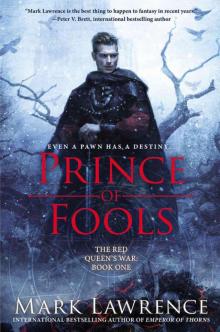 Prince of Fools
Prince of Fools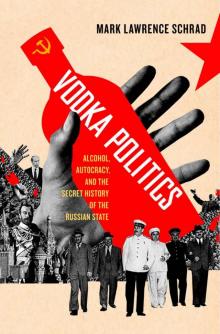 Vodka Politics: Alcohol, Autocracy, and the Secret History of the Russian State
Vodka Politics: Alcohol, Autocracy, and the Secret History of the Russian State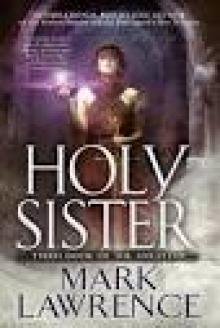 Holy Sister
Holy Sister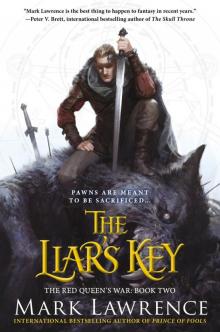 The Liar's Key
The Liar's Key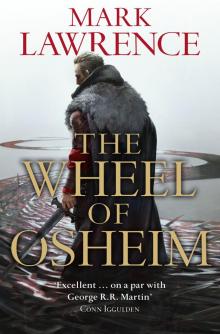 The Wheel of Osheim
The Wheel of Osheim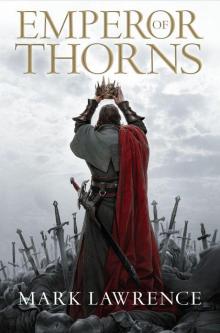 Emperor of Thorns
Emperor of Thorns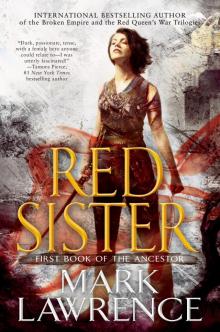 Red Sister
Red Sister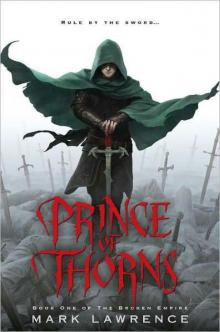 Prince of Thorns
Prince of Thorns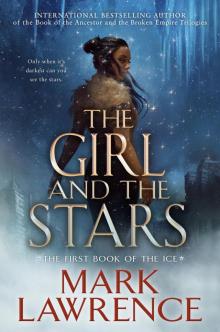 The Girl and the Stars
The Girl and the Stars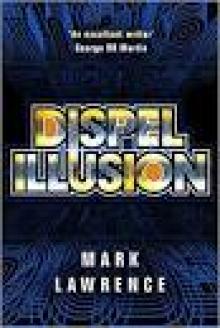 Dispel Illusion (Impossible Times)
Dispel Illusion (Impossible Times)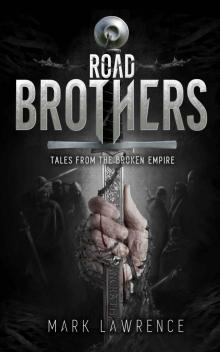 Road Brothers
Road Brothers Grey Sister
Grey Sister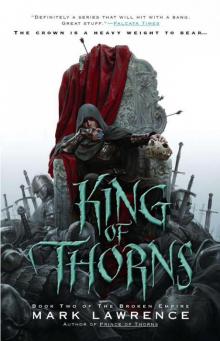 King of Thorns
King of Thorns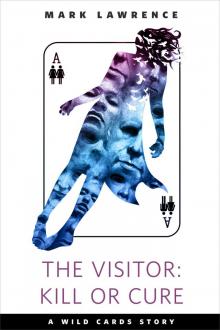 The Visitor--Kill or Cure--A Tor.com Original
The Visitor--Kill or Cure--A Tor.com Original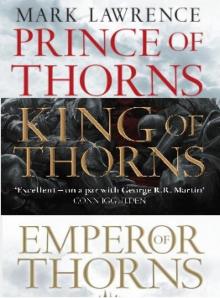 The Broken Empire Trilogy Omnibus
The Broken Empire Trilogy Omnibus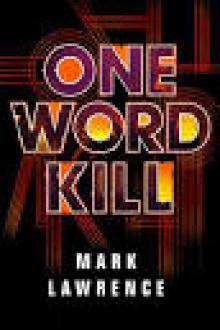 One Word Kill (Impossible Times Book 1)
One Word Kill (Impossible Times Book 1)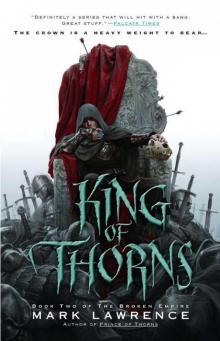 King of Thorns be-2
King of Thorns be-2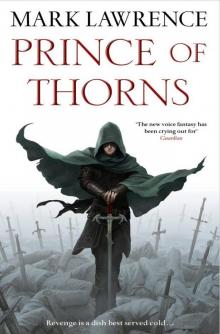 Prince of Thorns tbe-1
Prince of Thorns tbe-1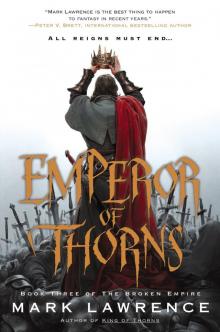 Emperor of Thorns tbe-3
Emperor of Thorns tbe-3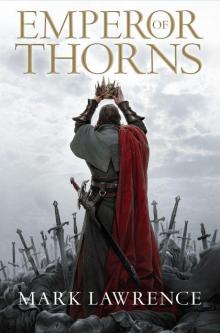 Emperor of Thorns (The Broken Empire, Book 3)
Emperor of Thorns (The Broken Empire, Book 3)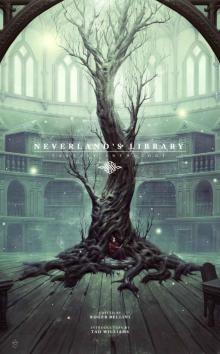 Neverland's Library: Fantasy Anthology
Neverland's Library: Fantasy Anthology